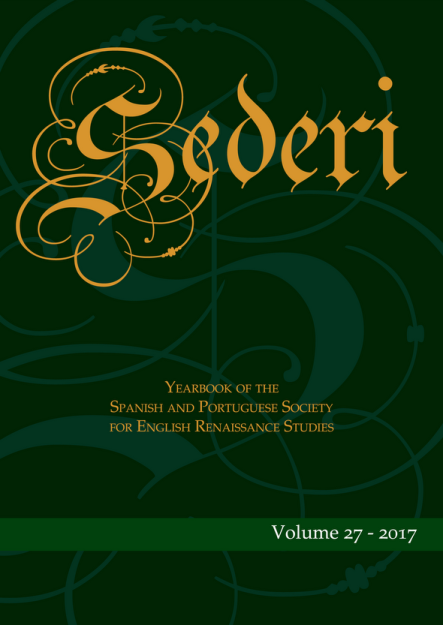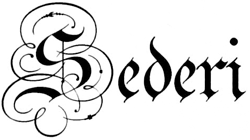
Sederi 27
Sederi 27 — 2017
EDITOR
Ana Sáez-Hidalgo
MANAGING EDITOR
Francisco J. Borge López
REVIEW EDITOR
María José Mora
ISSN 1135-7789
Juan de Dios Torralbo Caballero, “‘For know, alas, I’m dumb, alas I love’: Rhetoric of disability, female agency and tragedy in ‘The Dumb Virgin’.” SEDERI 27 (2017): 167–192.
DOI: https://doi.org/10.34136/sederi.2017.8 Download PDF
Abstract
This essay will focus on the two sisters of “The Dumb Virgin; or, The Force of Imagination,” addressing the crossover between disability studies, feminism and aesthetic theory. It will examine how art has the capacity to manipulate nature and how nature may be improved by the intervention of human industry. With this aesthetic duality, it will suggest that the writer reframes the concept of the ‘normal’ body, establishing a rhetoric of deformity and disability through the characters of Belvideera and Maria, both of whom overcome their natural disabilities by means of personal effort. Lastly, it will investigate the ‘misfortunes’ of several characters, paying particular attention to the educated nature of the two protagonists and how this poses a threat to the established order of society. The conclusion to be drawn from this is that their challenge to the social construct is directly responsible for the tragic climax of the narrative.
Keywords: Aphra Behn; “The Dumb Virgin”; female agency; rhetoric of disability and deformity; Restoration literature.
References
Abbott, H. Porter. 2002. The Cambridge Introduction to Narrative. Cambridge: Cambridge University Press.
Armstrong, Nancy. 1987. Desire and Domestic Fiction. A Political history of the Novel. Oxford: Oxford University Press.
Austen, Jane. (1818) 2006. Northanger Abbey. Edited by Barbara M. Benedict and Deirdre Le Faye. Cambridge: Cambridge University Press.
Backscheider, Paula R. 2000. Revising Women. Eighteenth-century “Women’s Fiction” and Social Engagement. Baltimore: The Johns Hopkings University Press.
Bacon, Francis. (1612) 2002. “Of Deformity.” In The Major Works including the New Atlantis and the Essays, edited by Brian Vickers, 426–27. Oxford: Oxford University Press.
Ballaster, Ros. 1993. “‘Pretences of State’: Aphra Behn and the Female Plot.” In Rereading Aphra Behn: History, Theory, and Criticism, edited by Heidi Hutner, 187–211. Charlottesville: University Press of Virginia.
Behn, Aphra. (1700) 1995. “The Dumb Virgin; or, the Force of Imagination.” In The Works of Aphra Behn. The Fair Jilt and Other Short Stories, Vol. III, edited by Janet Todd, 335–60. London: William Pickering.
Behn, Aphra. (1689) 1995. “The History of the Nun: or, The Fair-Vow-Braker.” In The Works of Aphra Behn. The Fair Jilt and Other Short Stories, Vol. III, edited by Janet Todd, 205–58. London: William Pickering.
Behn, Aphra. (1698) 1995. “The Unfortunate Bride; or, the Blind Lady, A Beauty.” In The Works of Aphra Behn. The Fair Jilt and Other Short Stories, Vol. III, edited by Janet Todd, 321–34. London: William Pickering.
Behn, Aphra. (1698) 1995. “The Unhappy Mistake; or, the Impious Vow Punish’d.” In The Works of Aphra Behn. The Fair Jilt and Other Short Stories, Vol. III, edited by Janet Todd, 411–42. London: William Pickering.
Behn, Aphra. (1688) 1997. Oroonoko. Ed. Joanna Lipking. New York: Norton & Company.
Blount, Thomas Pope. 1967 (1692). Essays on Several Subjects Written by Sir Tho. Pope Blount. London: Printed for Richard Bentley, in Russel-street in Covent-Garden.
Bowles, Emily. 2012. “Fatally Enjoy’d: Rape, Resilience, and the Accessibility in Aphra Behn’s The Dumb Virgin.” ABO: Interactive Journal for Women in the Arts, 1640–1830 2: 1–14.
Castle, Terry. 1986. Masquerade and Civilization. The Carnivalesque in Eighteenth-Century English Culture and Fiction. London: Methuen.
Chico, Tita. 2000. Designing Women. The Dressing Room in Eighteenth-Century English Literature and Culture. Lewisburg: Bucknell University Press.
Congreve, William. (1692) 2003. Incognita. Edited by Peter Ackroyd. London: Hesperus Press Limited.
Craft-Fairchild, Catherine. 1993. Masquerade and Gender: Disguise and Female Identity in Eighteenth-Century Fictions by Women. University Park: Pennsylvania State University Press.
Dryden, John. (1677) 2006. “The Author’s Apology for Heroic Poetry and Heroic License.” In The Norton Anthology of English Literature, edited by Stephen Greenblatt and M. H. Abrams, 2129–31. New York: Norton & Company.
Elk, Martine van. 2017. Early Modern Women’s Writing. Domesticity, Privacy, and the Public Sphere in England and the Dutch Republic. London: Palgrave Macmillan.
Fielding, Henry. (1742) 1980. “Preface.” In Joseph Andrews and Shamela, edited by Douglas Brooks-Davies, 3–9. Oxford: Oxford University Press.
Figueroa-Dorrego, Jorge. 1999. Aphra Behn (1640–1689). Madrid: Ediciones del Orto.
Fuchs, Barbara. 2004. Romance. New York and London: Routledge.
Garland-Thomson, Rosemarie. 2002. “Integrating Disssability, Transforming Feminist Theory.” MWSA Journal 10: 1–32.
Garland-Thomson, Rosemarie. 2005. “Feminist Disability Studies.” Signs 30 (2): 1557–87.
Garland-Thomson, Rosemarie. 2010. “Beholding.” In The Disability Studies Reader, edited by Lennard Davis, 199–208. New York: Routledge.
Genette, Gérard. 1972. Figures III. Paris: Éditions du Seuil.
Habermas, Jüngen. 1989 (1962). The Structural Transformation of the Public Sphere: An Inquiry into a Category of Bourgeois Society. Translated by Thomas Burger and Frederick. Cambridge: The MIT Press.
Hay, William. (1754) 2004. Deformity: An Essay. Edited by Kathleen James-Cavan. Victoria BC: University of Victoria.
Horace. 1783. The Art of Poetry. Epistle to the Pisos. Translated by George Colman. London: T. Cadell.
James-Cavan, Kathleen. 2005. “[A]ll in Me is Nature.” Prose Studies 27 (1–2): 27–38.
Johnson, Samuel. (1779–81).1984. “Pope.” In Samuel Johnson. The Oxford Authors, edited by Donald Green, 725–52. Oxford: Oxford University Press.
Johnson, Samuel. (1750) 2008. “The Rambler, no. 4 [The New Realistic Novel] (1750).” In Samuel Johnson. The Major Works including Rasselas, edited by Donald Greene, 175–78. Oxford: Oxford University Press.
McKeon, Michael. 2005. The Secret History of Domesticity. Baltimore: The John Hopkins University Press.
McKeon, Michael. 2017. “The Eighteenth-Century Challenge to Narrative Theory.” In Narrative Concepts in the Study of Eighteenth-Century Literature, edited by Liisa Steinby and Aino Mäkikalli, 39–77. Amsterdam: Amsterdam University Press.
Mintz, Susannah. 2006. “Freak Space: Aphra Behn’s Strange Bodies.” Restoration 30 (2): 1–19.
Mounsey, Chris. 2014. “Introduction.” In The Idea of Disability in the Eighteenth Century, edited by Chris Mounsey, 1–27. Plymouth: Bucknell University Press.
Nussbaum, Felicity. 1997. “Feminotopias: The Pleasures of ‘Deformity’ in Mid-Eighteenth Century England.” In The Body and Physical Difference: Discourses of Disability, edited by David Itchell and Sharon L. Snyder, 161–73. Ann Arbor: The University of Michigan Press.
Nussbaum, Felicity. 2000. “Dumb Virgins, Blind Ladies, and Eunuchs: Fictions of Defect.” In “Defects”: Engendering the Modern Body, edited by Helen Deutsch, and Felicity Nussbaum, 31–53. Ann Arbor: The University of Michigan Press.
Nussbaum, Felicity. 2003. The Limits of the Human. Fictions of Anomaly, Race and Gender in the Long Eighteeth Century. Cambridge: Cambridge University Press.
O’Donnell, Mary Ann. 2004a. “Aphra Behn: The documentary record.” In The Cambridge Companion to Aphra Behn, edited by Derek Hughes and Janet Todd, 1–11. Cambridge: Cambridge University Press.
O’Donnell, Mary Ann. 2004b. “Chronology.” In The Cambridge Companion to Aphra Behn, edited by Derek Hughes and Janet Todd, xi–xxii. Cambridge: Cambridge University Press.
Orr, Leah. 2013. “Atribution Problems in the Fiction of Aphra Behn.” Modern Language Review 108 (1): 30–51.
Pearson, Jacqueline. 1988. The Prostituted Muse. Images of Women & Women dramatists 1642–1737. New York: St. Martin’s Press.
Pearson, Jacqueline. 2004. “The short fiction (excluding Oroonoko).” In The Cambridge Companion to Aphra Behn, edited by Derek Hughes and Janet Todd, 188–203. Cambridge: Cambridge University Press.
Plutarch. 1878. Morals. Translated from the Greek by Several Hands. Corrected and Revised by William W. Goodwin, with an Introduction by Raph Waldo Emerson. 5 vols. Boston: Little, Brown and Co.
Pope, Alexander. (1711) 2008. An Essay on Criticism. In Alexander Pope. Selected Poetry, edited by Pat Rogers, 1–20. Oxford: Oxford University Press.
Pratt, Marie-Louise. 1992. Imperial Eyes: Travel Writing and Transculturalization. London: Routledge.
Reeve, Clara. 1785. The Progress of Romance, through times, countries, manners; with remarks on the good and bad effects of it on them respectively, in a course of evening conversations. 2 vols. Colchester: W. Keymer.
Robitaille, Marilyn. 1997. “Patterns of Iconicity in Aphra Behn’s The Dumb Virgin, Or the Force of the Imagination.” Conference-of-College-Teachers-of-English-Studies, Alpine, TX (CCTEP), Sept. 62: 1–10.
Scaliger. 1905. Select Translations from Scaliger’s Poetics. Edited by Albert S. Cook. New York: Henry Hork and Company.
Scott, Sarah. (1762) 1995. Millenium Hall. Edited by Gray Kelly. Peterborough: Broadview Press.
Seager, Nicholas. 2012. The Rise of the Novel. A Reader’s Guide to Essential Criticism. London: Palgrave.
Shakespeare, William. (1623) 2007. The Winter’s Tale. Edited by Susan Snyder and Deborah T. Curren-Aquino. Cambridge: Cambridge University Press.
Shakespeare, William. (1603) 2014. Hamlet. Edited by Philip Edwards. Cambridge: Cambridge University Press.
Sidney, Sir Philip. (1595) 2002. An Apology for Poetry (or The Defense of Poesy). Edited by R. W. Maslen. Manchester: Manchester University Press.
Todd, Janet. 1995. “The Dumb Virgin.” In The Works of Aphra Behn. The Fair Jilt and Other Short Stories. Vol III, edited by Janet Todd, 336–37. London: William Pickering.
Todd, Janet. 1996. The Secret Life of Aphra Behn. London: André Deutsch.
Torralbo-Caballero, Juan de Dios. 2015. “‘The Greatest Extasy or Bliss’: Realism, Subversion and Eroticism in The Dumb Virgin; or The Force of Imagination.” Revista Canaria de Estudios Ingleses 71: 143–62.
Trofimova, Violetta. 2011. “Magic and Irrationalism in Aphra Behn’s and Jane Barker’s Prose Fiction.” In Aphra Behn and Her Female Successors, edited by Margarete Rubic, 109–19. Berlin: Lit Verlag.
Yao-Hsi, J. Shih. 2014. “Fancy, Gender and Race in Aphra Behn’s The Dumb Virgin and The Unfortunate Bride.” Hikma 13: 173–92.
